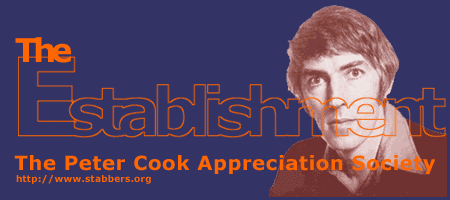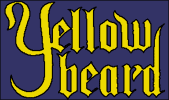|
A couple of months ago we noticed a couple of references
on the Internet Movie Database to what appeared to be a new video
available only over the Internet called Group Madness, claiming
to be a "A behind the scenes romp with the funniest comics in the
world," and starring our very own Peter Cook. It required a bit
of mucking about to find the site we could  actually
buy the bloody thing from but eventually we landed up at http://www.mileham.com/groupmadness.html
which would appear to be the only site where you can actually purchase
this film, and for what seemed an entirely reasonable ten US dollars. actually
buy the bloody thing from but eventually we landed up at http://www.mileham.com/groupmadness.html
which would appear to be the only site where you can actually purchase
this film, and for what seemed an entirely reasonable ten US dollars.
Now, before you reach for your cheque books, a few
words of warning about trying to get hold of this film. As the page
itself warns you, this film is only available for sale within the
US, so if you don't live there you'll have to get a friend over
the pond to buy it for you (thanks to Rich Henderson) and then arrange
to have it sent to you, a complicated process which roughly doubles
the total price of getting it. Secondly, it is only available in
American NTSC format rather than, say, the PAL format we use over
here in the UK, so you'll need a video player that can handle NTSC.
And thirdly, it's rubbish.
What you get for your money is basically a 1983
40 minute promo film for Yellowbeard, the film Cook wrote with Graham
Chapman and Bernard McKenna starring a whole host of comedy stars
from both sides of the Atlantic. Yellowbeard is itself a very uneven
film, to be polite about it, and suffers from much the same problem
Hound Of The Baskervilles did, a dodgy script with a whole bunch
of comedy performers bunged at it in the hope that something funny
will come out the other end. Yellowbeard bombed at the box office
and it is generally agreed by all the participants to be have been
an artistic as well as commercial failure. But what they also say
is what terrific fun it was to make - OK so the film was shit and
no-one went to see it, but what about the parties? Oh God the parties!
Flying the cast and crew out to Mexico to re-create an 18th century
English port, what a hoot! And now we have Group Madness, the film
that takes you behind the scenes of the shooting of Yellowbeard,
with all those stars partying like there's no tomorrow.
So, do you get to see Peter Cook dragging Eric Idle
off to a Mexican brothel to score some grass? No, you don't. What
you get is a very dull "Making of the Movie" type programme the
like of which usually gets itself shown on the ITV Saturday afternoon
schedule somewhere between Saint and Greavsie and the final scores
which, unsurprisingly, is exactly what Group Madness originally
was.
After a rambling introduction promising much wackiness
ahead, the film is broken down into sections giving a profile of
all the major cast members. Oddly, as Yellowbeard was the brainchild
of its star, Graham Chapman, he seems to have little to do with
Group Madness and the centre of attention becomes Eric Idle, who
appears to be at pains to impress one and all with his trombone
impression. The section on John Cleese only actually features a
couple of clips from the film and some footage of him mucking about
on set between takes with someone else talking about how he has
a great "conceptual grasp" of comedy without even an attempt to
interview the man himself. For the section on Cook himself, he says
little and is generally to be seen wondering around in the background
while other people talk about him. There's a nice clip of the crew
presenting him with a cake on his birthday, but if you want anything
of substance, forget it.
A couple of the sections are quite interesting and
is generally at its most interesting when at its most serious -
Marty Feldman talks movingly about what motivates him as a performer,
and Eric Idle gives us his theory of comedy, which sounds great
until you remember Nuns On The Run and Splitting Heirs. And, representing
the 'younger' generation, although in fact already well passed the
sell-by date several years before, Cheech & Chong look rather sweet
as they try to expand their comedic repertoire beyond their usual
one-trick "Hey, we smoke cannabis, isn't that hilarious?" routine.
Ultimately the film's greatest failing is that it
doesn't involve the viewer in the fun it tries to capture. The subjects
of the film may well have been  having
the time of their lives, but you're never going to make the viewer
feel part of it by just sticking a camera in front of the hilarity
and saying "Look, here's some fun." The whole effect is rather like
being in a pub at a table full of pissed people while you're stone
cold sober. Here Michael Mileham, the director, reveals his background
in news and documentary film-making - he is reporting on people
having a laugh rather than communicating the laughter to the viewer
and getting him involved in it. Some of the scenes might have been
funny when they happened, they might still be funny if you had been
there and were looking back at a fondly remembered time, but for
anyone else the whole thing is flat and pointless. having
the time of their lives, but you're never going to make the viewer
feel part of it by just sticking a camera in front of the hilarity
and saying "Look, here's some fun." The whole effect is rather like
being in a pub at a table full of pissed people while you're stone
cold sober. Here Michael Mileham, the director, reveals his background
in news and documentary film-making - he is reporting on people
having a laugh rather than communicating the laughter to the viewer
and getting him involved in it. Some of the scenes might have been
funny when they happened, they might still be funny if you had been
there and were looking back at a fondly remembered time, but for
anyone else the whole thing is flat and pointless.
That said, there are a few exceptions to this. Bernard
McKenna and Marty Feldman put together some sketches for the camera,
one based on McKenna's impression of David Attenborough in the famous
gorilla scene from Life On Earth, with him searching for Feldman.
While the premise for this sketch has been done to death by subsequent
generations of comedians, at least it tried to entertain the viewer.
Spike Milligan does a few jokes for the camera, Cook comes up with
a couple of nice quips and is quite funny with Ken Mars, and Idle
does his trombone impression again, but these are the exceptions.
One thing the film does illuminate, albeit unknowingly,
is why Yellowbeard was such a failure. The conscious attempt to
combine the Monty Python house style with the Mel Brooks team, as
represented by Feldman, Madeleine Kahn and Peter Boyle was doomed
from the start; the attempt to marry literate surrealism with broad
pastiche, both perfectly fine in their place, is at the centre of
the film's problems. This leads to many discussions concerning the
differences between English humour and American, but even this doesn't
lift itself to the level of insightful debate, with various cast
members merely repeating over and over again that, err, Americans
tend to be quite extrovert and the English tend to be a bit reserved.
Henri Bergson it isn't.
There are nice bits to this film, in a sort of "not
actually boring" kind of a way, and it's always nice to see Michael
Horden and James Mason being interviewed, and David Bowie even gets
a little section to himself even though he only has about three
lines in the actual film. However, the film's stated aim is to act
as a memorial to a group of great comedians, which they are, many
of whom are no longer with us, all gathered together in one place
and having the time of their lives. But really the only way to remember
them is to go out and buy the films they're actually good in - you
won't find anything here about what made them great. If you are
the ultimate Cook or Python collector and absolutely must own every
square inch of videotape with their faces on it then I suppose ten
dollars isn't a huge amount to pay, just don't say we didn't warn
you.
|



 actually
buy the bloody thing from but eventually we landed up at
actually
buy the bloody thing from but eventually we landed up at  having
the time of their lives, but you're never going to make the viewer
feel part of it by just sticking a camera in front of the hilarity
and saying "Look, here's some fun." The whole effect is rather like
being in a pub at a table full of pissed people while you're stone
cold sober. Here Michael Mileham, the director, reveals his background
in news and documentary film-making - he is reporting on people
having a laugh rather than communicating the laughter to the viewer
and getting him involved in it. Some of the scenes might have been
funny when they happened, they might still be funny if you had been
there and were looking back at a fondly remembered time, but for
anyone else the whole thing is flat and pointless.
having
the time of their lives, but you're never going to make the viewer
feel part of it by just sticking a camera in front of the hilarity
and saying "Look, here's some fun." The whole effect is rather like
being in a pub at a table full of pissed people while you're stone
cold sober. Here Michael Mileham, the director, reveals his background
in news and documentary film-making - he is reporting on people
having a laugh rather than communicating the laughter to the viewer
and getting him involved in it. Some of the scenes might have been
funny when they happened, they might still be funny if you had been
there and were looking back at a fondly remembered time, but for
anyone else the whole thing is flat and pointless.